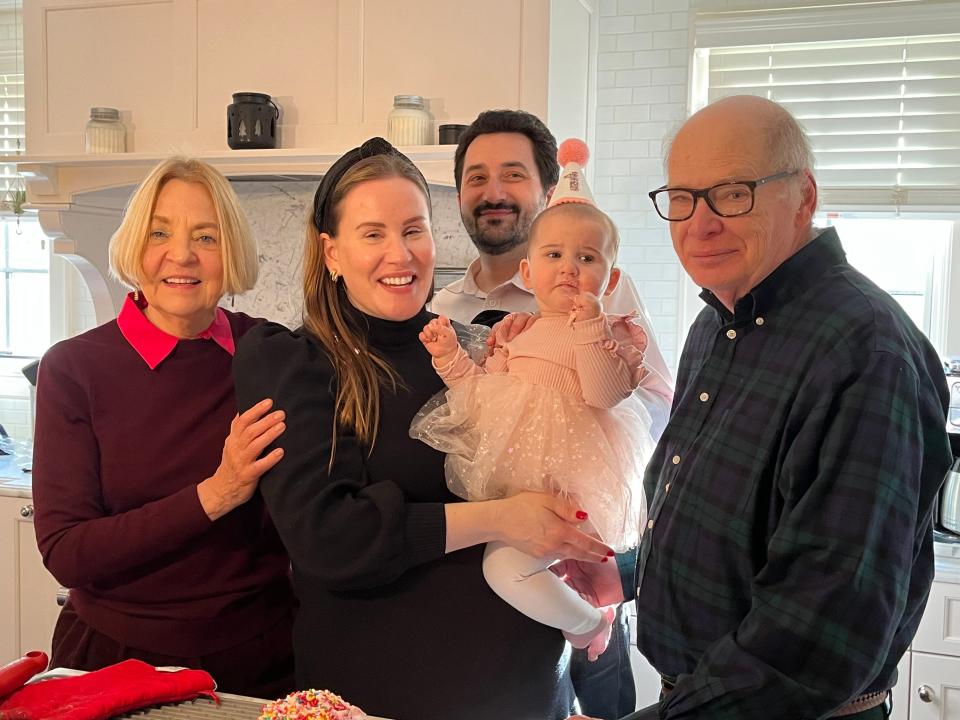Grandparents are the key to millennial parents securing generational wealth
Daphne Deveraux, an advocate for improved childcare, said parents with family nearby are better off.
The employment lawyer said it's a key factor in generational wealth, both financial and emotional.
BI spoke to a mom who paid $4,000 monthly for a nanny and one whose parents do the job.
When millennial Jessica Papi was trying to get pregnant, she discussed future childcare options with her mom, Carol Mooney.
They both knew paying for a nanny or day care would significantly impact Papi and her husband's income. It would be particularly expensive since they'd often need 12 hours of daily cover.
"Mom said, 'I want you to have a career, so we'll support you with this,'" Papi told Business Insider, adding that her boomer parents were thinking of her finances and peace of mind.
The problem was that the would-be grandparents lived at least a two-hour drive from her home in New Jersey. After debating the pros and cons, they decided that Mooney and her spouse should leave New York and move near their daughter and son-in-law.
Papi said she and her husband were more financially stable due to her parents' support
Their new house could barely be closer. "It's literally around the corner and one minute's walk away," Papi, a finance worker, said.
Now the mother of a baby girl, the 38-year-old said she is extremely lucky to have such an agreement with her relatives. "We can have a nice family life without being too stretched," she said,
Some of the money the Papis save on childcare costs goes toward their retirement funds. They also plan to set up an investment account for their daughter.
"These arrangements are incredibly beneficial to parents," employment attorney Daphne Delvaux, who advocates for better childcare provision in the US, told Business Insider.

She said parents like Papi are at a significant financial advantage, particularly due to the rising cost of living. Those without voluntary childcare support from grandparents struggle to pay into their 401Ks and cover their mortgages.
"It has the effect of being unable to keep money within the family constellation," she said, noting that many millennials are worse off than their parents at the same stage of life.
"Parents are forced to put money into childcare they would otherwise put into family assets."
Devika Tandon can certainly relate. She and her husband, who have an almost 3-year-old, needed to dip into their savings to pay for childcare.
The California couple paid a nanny $4,000 monthly for the first two years of their son's life. He is now in day care, which costs between $1,600 and $2,000 a month, depending on their needs.
Tandon does not have a 'village' to help with childcare
"It's expensive in Los Angeles compared to some other parts of the country, whether it's your groceries, getting a car or buying a house," Tandon said. She said hourly rates for babysitters in the city ranged from $20 to $35, although $20 was "uncommon these days."
Tandon said if her parents didn't live in Toronto, they would do their best to ease the financial and emotional toll of outsourcing childcare. Their son's paternal grandparents live in New Jersey.
"It's a difficult situation," Tandon, a lawyer who works up to 10 hours daily, said. "We had no choice but to pay an exorbitant amount for childcare because we didn't have family as a village to help us."

Meanwhile, the 36-year-old said she'd feel more comfortable if relatives watched her toddler. "It's different when it's family," she added.
Delvaux, who primarily advocates for maternity rights at work, said parenting can be "suffocating" for people without ready access to their children's grandparents.
"It's a safety net that can catch you when you fall," she said. Moms have even told me they wouldn't have had children without their parents' voluntary availability."
Her cases in employment law have included women fired or having to quit after running out of PTO for childcare emergencies. "They take a huge monetary hit, and it impacts career advancement," she said.
Delvaux wants the US government and private employers to address the childcare struggles of working parents
The mom of two told BI she spoke from personal experience. Her husband's family is based on the opposite coast in California, and her parents live in Belgium. "My business would be at a very different level now if I'd had backup from my parents," she said.
She praised tax-funded childcare provision in parts of Europe, such as France, where many nurseries — known as "crèche" for kids aged up to three — are free or heavily subsidized. "In Belgium, government-run daycares take babies at three-months old," Delvaux added
By contrast, she said the US system was failing working parents who were held back by expensive childcare. She hoped the government and private employers in American would fully recognize and address the crisis.
"It's at the root of many of the financial and societal issues of our time," Delvaux said.
Do you have an interesting story about being a working parent you'd like to share with Business Insider? Please send details to jridley@businessinsider.com
Read the original article on Business Insider

